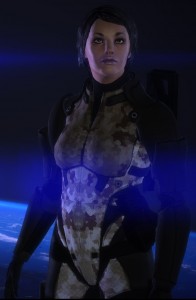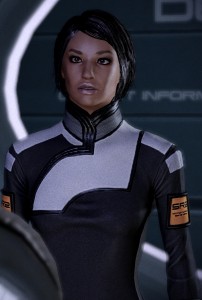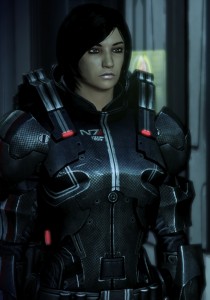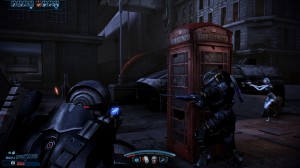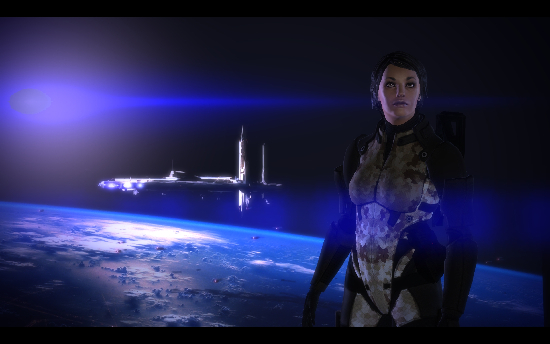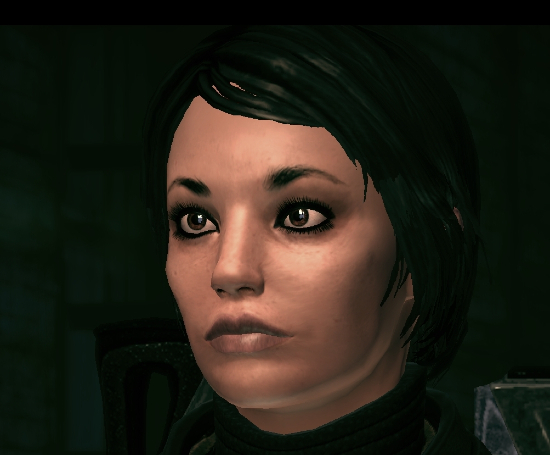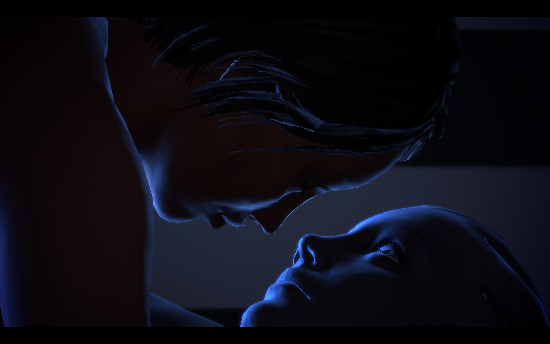So that was the weekend that was; that is to say, that was the weekend that was when I finished Mass Effect 2. I’m left feeling slightly more empty than I was when I finished Dragon Age: Origins, I think it’s probably as much to do with the fact that I took time to complete everything I could in Mass Effect 2 and therefore have no desire to go back through it, even if there is the option to play as a renegade rather than a paragon. Let’s face it though, there’s no real difference between the two at the end of the day: in the paragon version of events you would verbally persuade a guard that it would be better for their family and friends if they let you through the door, and they would thank you for the advice and let you go on your way, whereas in the renegade version you explain things via the arcane diplomatic art of fracturing their skull against a door frame, and they thank you for the advice through the remaining half of their jaw, and let you go on your way.
Both Dragon Age: Origins and Mass Effect 2 follow Bioware’s now standard technique for telling a big story with various branches: hero exists; hero is tasked with saving the country/planet/universe; hero goes around recruiting a formidable group of allies through various location-based missions; hero finds out that all of the people they have recruited are wet-blanket children who can’t solve personal problems on their own; hero runs around several other locations solving the teenage angst of their companions; hero runs around a bit more to make sure they’ve done any plot-inconsequential side missions that might award some sexy looking armour or weapons; hero goes to obvious location of Final Battle; hero defeats inevitable Big Bad; some party members leave/die depending on a few arbitrary decisions that sometimes make sense, sometimes not. The End.
As far as it goes it works, and works well enough, because they’ve had several generations of games to iterate through and perfect the system, but once you’ve played through a few, Bioware’s games do seem a bit like RPG Trivial Pursuit: fill up your little party-wheel with coloured wedges of heroes, and once you have a full set, head in to the middle of the board to answer the final boss question, which is always either about dragons or giant robots depending on whether you picked the Fantasy or Sci-Fi category.
So the game design is fairly formulaic within the little genre that Bioware have created, which, in a fit of inspired originality, we shall call Bioware RPGs, but also the game play often has obvious flaws or bugs in it.
In Dragon Age: Origins my rogue character kept heading into melee every battle, even though I had their preset tactics set up for archery, because I’d picked a selection of archer talents. I didn’t want to have to micro-manage them every fight, like some sort of errant three-year-old child who happens to like stabbing people to death with daggers.
“No dear, I’ve told you before, use your bow to kill the bad men or you won’t get any pudding tonight. Oh now, there’s no point in rolling around on the floor like that, it’s not going to change anything. No, banging your head on the chest of loot won’t work either. And stabbing the cat is right out! Go to your room young lady and think about what you’ve done!”
So I bit the bullet and went into the tactics menu and set a bunch of options, I can’t remember what, precisely, but essentially the plan was to force them in any situation to get their bow out and shoot from range. I don’t know quite how I managed it, but what I ended up with on the first fight was a rogue who stood on the edge of the battle and just constantly swapped between their daggers and their bow, unsheathing one, only to put it a way and draw the other. It’s like my rogue was having some sort of authority crisis, or they had suddenly turned from a tempestuous toddler into a sullen teenager who was going to do exactly what I asked in just such a way that meant they weren’t doing what I intended, before stamping up the stairs to their room and sulking to the sounds of Ben Folds Five or Jimmy Eat World. So I did the thing that any parent would do given the chance, I took them gently to one side, made thoughtful meaningful eye contact, and carefully smacked them upside the head. Then took the dog with me instead.
In Mass Effect 2 I had a similar problem, but this time I was Bugs Bunny and I had Daffy Duck on my team. There are various ammo abilities in the game that, as a soldier, I could level-up to add extra effects, my favourite being the Cryo ammo which had a chance to nullify enemies by encasing them in ice, and if you got a lucky shot, you could then shatter them into a million satisfying pieces, essentially getting a kill for far less ammo than you might otherwise have had to expend. At its maximum rank you can choose to have this ability freeze more often, or instead have it apply to every member of your group; since it already froze enemies on a pretty regular basis, I went for the latter option with the thinking that more people using it would mean more frozen enemies, and indeed that worked wonderfully. The issue came when I was forced to take Jacob along with me for his side mission. I hadn’t used him much on away missions as I didn’t really care too much about him, primarily stemming from the fact that every conversation option about Getting Jiggy With It led to him being all coy and bashful and… YEAH, RIGHT, have you seen my sexy female butt in this officer’s outfit? I’m offering it to you, no questions asked, and you want to talk about it later because you’re unsure? Fine, I’m following Tamarind’s advice and going gay for Garrus instead. Look, I’ve had a placard made up and everything; we’re doing a march around Citadel next Sunday: Garrus Pride.
Anyway.
Not really caring in the slightest for little miss prude pants over there, I hit his auto-level-up button. Which was a mistake, I admit. It turns out that he gets an ammo boosting ability too, one that sets people on fire; a flaming enemy is useful enough, but having both ammo types myself I found the soft control provided by the Cryo ammo to be a far better option. He also, as it happens, had taken the Give This Effect To All Group Members ability. Now, it turns out that you can only have one of the group ammo abilities apply at a time, so you can probably see where this is going. Of course I hadn’t realised that he had this ability, I had just punched the Yeah Whatever level-up option, and got on with the mission. It was shortly after the first fight that I began to wonder why the enemy forces were suffering a large number of flame-based deaths when I had my Cryo ammo set — I was reasonably certain that Flamey Death and Freezey Death were at opposite ends of the F’ing Death spectrum. I checked my gun and, sure enough, I had Inferno ammo set. Curious, never mind, I’ll set Cryo ammo and away we go! Freezey Death. Freezey Death. Freezey Death. Fiery Death. F… wait, what? And so it would continue: Set Cryo ammo; enter combat; Freezey Death; Freezey Death; Fiery Death; Swear Loudly.
It didn’t take me too long to realise what was going on, and that there was no obvious way to tell him to turn off his Inferno ammo. I did a quick search on a few forums and all I turned up was a bunch of, y’know, Forum People (imagine that phrase whispered, with that haunted look in one’s eyes, in a tone of voice reserved for use when talking about the criminally insane. Or Right To Roam advocates). The next combat I entered I waited until he had activated his Inferno ammo, overwriting my previously active Cryo ammo, then went in and switched the power off in his power selection bar. Turning my Cryo ammo back on I carried smugly on with the fight. Freezey Death. Freezy Death. Fiery Death. F’ing Death to you Jacob, you git!
I wouldn’t be beaten though, oh no.
It was at this point that we got into the aforementioned Bugs Bunny versus Daffy Duck battle of wills, as I resolved to pretty much ignore combat and concentrate on turning on my Cryo ammo whenever I saw Jacob turn on his Inferno ammo.
“Cryo season”
“Inferno season”
“Cryo season!”
“Inferno season!”
“Cryo season!”
“Inferno season!”
“Inferno season!”
“Ok, good, glad you agree”
“Fuck you, Jacob!”
All the while the enemy is stood around, some looking nervously at each other, others twisting one foot on its side and staring embarrassedly at the sole of their boot as they rock back and forth on it, yet others kicking at stones and suffering that intense moment of panic when they see the stone veer off in the direction of the two idiot humans yelling red-faced at each other on the other side of the battlefield. The humans see the stone whiz past, look up and seem to see the enemy for the first time, and then set the poor unfortunate individual on fire under a hail of Inferno ammo, then just as rapidly extinguish the flames and freeze the poor sod in place, before melting the ice away with a hail of incendiary fire, and so on and so forth, until eventually the poor fellow simply evaporates into a steamy mist and his companions look on in slack-jawed disbelief and wide-eyed horror while the humans go back to arguing with one another.
Thankfully my two regular companions didn’t have such ammo options; even so, I made sure I levelled them up by hand, just in case they tried to sneak a new ammo power in there while I wasn’t looking.
So what makes these Bioware games great? The game design is formulaic within the Bioware RPG genre. The game play is good, but isn’t outstanding by any measure: the cover system in Mass Effect 2 is a great addition, for example, but just doesn’t seem to be as elegant as that found in, say, Gears of War; the cover system is also somewhat infuriating.
“Hah, I see you Mr Enemy, and I shall duck behind this wall and fire from cover, what do you think about that?!”
“Well, I can only commend you on your tactics. I concede that it is a well thought out and thoroughly good plan. I, however, will see your ‘Cover’ and raise you ‘Walking Through A Hail of Bullets and Crowd Control And Just Punching You In The Face While You’re Glued To A Wall And Unable To Attack Me Back’.”
“Touché. And also: Ow, my face.”
There are a number of game play ‘features’ that are undesirable; also, the textures on many of the NPC character outfits look awful to the point of distraction when in a close-up shot, such as in most conversations; and then there’s the planet scanning/probing/mining mini-game. Actually, let’s not go there, that’s a dark place and my counsellor worked so very hard to help me get through it without too much medication. Suffice it to say, if you’re an MMO player it will nearly kill you via your OCD completionist indoctrination, and if you’re not an MMO player then you’ll do the bare minimum to gather the resources you need to complete the game, and remember later that you were quite bored at the time.
So what makes most games journalists froth at the mouth at these Bioware games, because on the whole, if you take a hard look at them, they’re not perfect by any sense of the imagination. My theory is simple, and probably fairly obvious: they tell a good story with your character at the centre of it. That’s it. If Bioware remade Pacman then Pacman would go around trying to recruit pellets to help him, those pellets would refuse to activate his super power unless he helped them find their long lost aunt on the other side of the map, he’d do a bunch of side missions in order to grab some fat fruit loot, and then he’d head in to the final battle with a bunch of ghosts, using his pellet companions to weaken and defeat them, and any pellets he didn’t need to use would come back for Pacman 2. There would be problems with the game play: sometimes pellets wouldn’t activate properly, or Pacman would go off one side of the screen and never come back on the other. However, there would also be a tale woven between all of this, about how our man was the last in the long and noble line of Pac, and that an ancient blight of undead was once again upon the lands and could only be defeated if he discovered how to wield the unknowable Power of Pellet, knowledge long lost to his people in the dim mists of history. Pacman would become a personality to you, because you influenced his decisions on which pellets to get and which paths to take, and therefore you can identify with the character, because that character is, in part, you.
Until a character becomes a personality it cannot be believed. Without personality, the character may do funny or interesting things, but unless people are able to identify themselves with the character, its actions will seem unreal. And without personality, a story cannot ring true to the audience. — Walt Disney
And Bioware’s Pacman would be a magical experience.
There is another company that offers magical experiences, one form of which is the theme park. They have people they call Imagineers who build systems that offer escapism, albeit briefly, into another world. If you look too closely at the rides you can see the wires, the smoke machines, and the rotating mirrors that cause things to appear out of nothing as if by magic. If you sit back, however, and relax into the ride, let the experience wash over you, you find yourself transported somewhere fantastic, and when you come out at the other end you find yourself a little disappointed to find that the world in which you live is somewhat mundane in comparison.
I imagine that Bioware’s version of Imagineers have been busy for some time crafting the Dragon Age 2 and Mass Effect 3 experiences, and I find myself joining the back of the already miles-long line of people, breathless in anticipation of my chance to ride on Bioware’s next great digital ride.
We like to have a point of view in our stories, not an obvious moral, but a worthwhile theme. … All we are trying to do is give the public good entertainment. That is all they want. — Walt Disney
